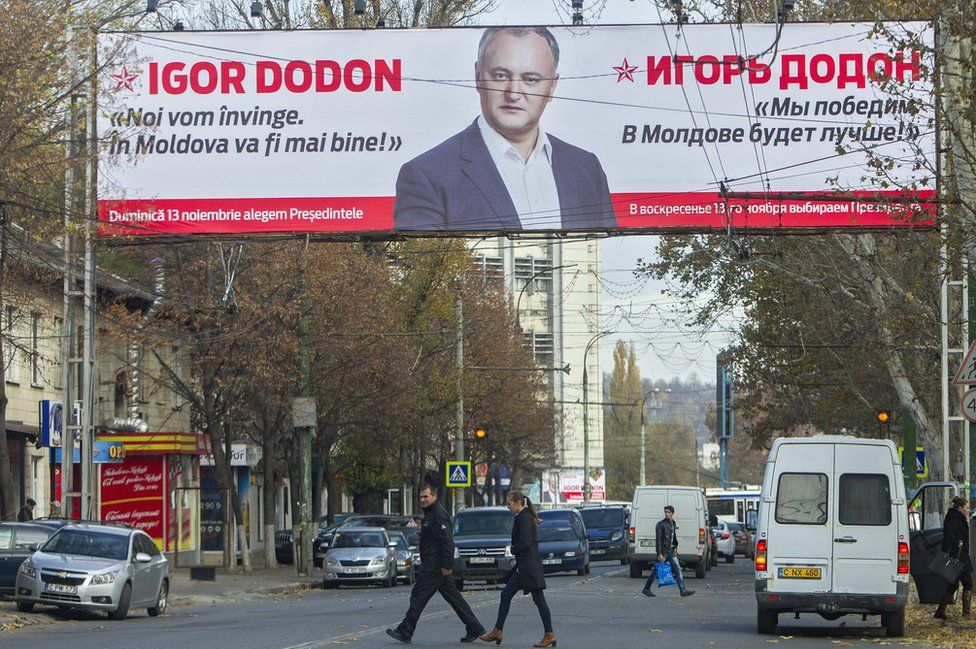Will Moldova elect Putin fan Igor Dodon as president?
- Published

A politician who wants to restore close ties with Russia is tipped to win the second round of Moldova's presidential election on Sunday.
Igor Dodon, head of the Party of Socialists (PSRM), is riding a wave of public discontent in this impoverished ex-Soviet republic.
Moldova has moved closer to the European Union in the past seven years, a course championed by his rival, former education minister Maia Sandu.
Mr Dodon, 41, was a deputy prime minister in the Party of Communists government before 2009. He blames widespread corruption on the pro-EU parties which have ruled Moldova since then.
Corruption scandal
Last year, three banks collapsed and $1bn (£790m) disappeared - equal to about one-sixth of the country's GDP. Mr Dodon repeatedly tried to pin the blame on Ms Sandu, as she was in the government on whose watch the "theft of the century" happened.
She strongly denied that accusation, and is seen as one of the few "clean" politicians in Moldova.
In the first round, on 30 October, she got 38% of the votes, while Mr Dodon got 48%.
Frozen conflict
Mr Dodon has promised to revoke Moldova's association agreement with the EU. But recently he has appeared less committed to that pledge, especially as Moldovans can travel visa-free in the EU's Schengen area, which covers most of Europe but excludes the UK and Ireland.
He has vowed to take Moldova into the Russia-led Eurasian Economic Union, which includes Belarus, Kazakhstan, Kyrgyzstan and Armenia.
He has proposed turning Moldova into a federal state, to solve the frozen conflict in Trans-Dniester, a region run by pro-Moscow separatists for the past 26 years, where Russian troops are still deployed.
This year Moldova reverted to direct presidential elections after a 20-year hiatus. But the president does not have strong powers to deliver the changes many Moldovans are clamouring for, especially tackling corruption.
"We want a leader close to the people, not to the oligarchs," said Maria, from the Chisinau suburb of Ghidighici.
"First of all we need an improvement in the economy. The president should fight corruption. They all appeal to those abroad to return home, but what can they do here? There are no jobs. Electricity, gas, everything is getting more expensive. A pensioner cannot survive on 1,000 lei ($50) [per month]."
She said Moldova should maintain good relations with its neighbours in the EU and with Russia.
Republic of Moldova
Capital: Chisinau
-
Population 3.5 million
-
Area 33,800 sq km (13,050 sq miles)
-
Major languages Romanian (called "Moldovan" in official documents), Russian
-
Major religion Christianity
-
Life expectancy 66 years (men), 73 years (women)
-
Currency leu
Vlad, a young disabled man, said that politicians should "come up with actions, not just promises and words.
"The next president should be concerned about the problems of disabled people. They should be able to get a job, to have the same rights as other citizens."
Warming to Russia
Mr Dodon is a great admirer of Russian President Vladimir Putin, saying Moldova needs a similarly strong leader.
He has angered neighbouring Ukraine by describing annexed Crimea as de facto part of the Russian Federation. That raises the spectre of a diplomatic conflict if he becomes president.
But many voters, including most of the Russian speakers who make up almost 25% of the electorate, do not seem to mind, as long as Russia is seen as supportive of Mr Dodon.
He criticises Ms Sandu for wanting reunification with Romania, which included Moldova (formerly Moldavia) between the two world wars.
Mr Dodon is also supported openly by the Moldovan Orthodox Church, which is subordinate to the Moscow Patriarchate.
Orthodox Bishop Marchel urged voters to support him as a "Christian and patriot", contrasting him to Ms Sandu, who is single and childless.
Both Mr Dodon and Bishop Marchel have said that Ms Sandu is supported by gay people in Moldova, a country where homophobic attitudes are deeply entrenched.
Limits on power
In the end, if elected, Mr Dodon could find it hard to deliver many of his promises.
In that case "he should govern like the French President De Gaulle in the 1960s, by referendum", suggested Igor Botan, a political analyst close to Ms Sandu.
"He should call a referendum for each promise and if he loses, he should resign," he added.
The president appoints judges and sets foreign policy priorities, but other major decisions need the approval of parliament.
- Published27 January 2016
- Published21 January 2016
- Published31 May 2023
- Published22 May 2023
- Published14 September 2015
- Published18 June 2015